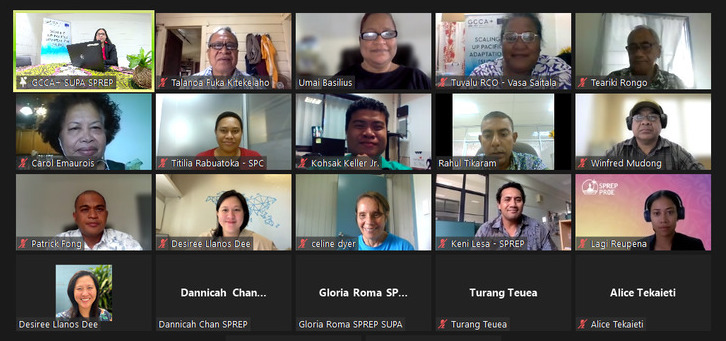
30 May 2022, Apia - Tonga’s experience after trialing an Impact Analysis (IA) methodology on the groyne structure at Hahake District and the rock barrier at ‘Ahau village has been shared with other countries to inform the work in measuring the progress of climate change adaptation work in the Pacific.
Tonga, as one of four countries that cooperated with the field-testing of the impacts analysis methodology, applied the IA tools on coastal protection measures along the Tongatapu coastline. The assessment was to gauge the level of awareness and preparedness of the affected community to climate change disasters and to determine whether the adaptation measures introduced in the community remain adequate in changing conditions. Tonga’s National Consultant, Mr Fuka Kitekei’aho, said the methodology and IA tools including a public poll, household survey,focus group meetings and a Checklist, rated the success of the structural measures to protect the coastline and the frontline communities, as Medium impact.
“This is a very useful analysis which is still ongoing and it would reveal the impacts of the coastal structures in terms of coastal erosion or accretion,” said Mr Kitekei’aho. “Most of the people from both communities (Hahake and Hihifo) accept that the two structures are protecting their lives and properties. However, the monitoring results were not presented to affected communities at regular intervals, leaving the communities with a false sense on security.”
Since 2013, coastal protection has been a predominant adaptation action along the Tongatapu coastline. Records show that 10% of island population lived adjacent to coastal protection measures implemented over a 6-to-10-year history of adaptation. In this period, 736 families benefited from an array of adaptation actions, awareness raising, capacity building and community outreach. This accounted for 11.6% of coastline protected with structural and non-structural measures.
Like most island countries, Tonga is experiencing the impacts of climate change with rising seas, warming temperatures, varying rainfall patterns and prolonged period of extreme dry conditions. These vulnerabilities and challenges have been exacerbated by the recent Hunga Tonga - Hunga Ha’apai underwater volcano eruption, and tsunami. Mr Kitekei’aho noted that the groyne structure at Hahake District has been completely disfigured by the volcano and tsunami in January 2022.

Tonga’s experience was shared with other Pacific countries during Segment Two of the Practice Learning Series, organised by the Secretariat of the Pacific Regional Environment Programme (SPREP) team as part of the Global Climate Change Alliance Plus Scaling up Pacific Adaptation (GCCA+ SUPA) project. The Practice Learning Series consist of nine segments, scheduled up until November 2022, designed to examine adaptation in practice through an impacts analysis methodology.
The national consultant worked closely with Tonga’s Department of Climate Change under the Ministry of Meteorology, Energy, Information, Disaster Management, Environment, Climate Change and Communications (MEIDECC) to field trial the Impacts methodology.
The priority sectors the impacts analysis methodology targets are Water Security, Resilient Agriculture,Marine Resource Management and coastal protection. Segment Three of the Series is scheduled for 22-24 June 2022.
To join, or if you are interested, please contact: GCCA+ SUPA Project Manager, Ms. Monifa Fiu on email: [email protected] or GCCA+ SUPA Information and Research Officer, Ms. Gloria Roma on email: [email protected]
ABOUT THE GCCA+ SUPA PROJECT
The GCCA+ SUPA project is about scaling up climate change adaptation (CCA) measures in specific sectors supported by knowledge management and capacity building.
The four and a half year project (2019-2023) is funded with € 14.89 million from the European Union (EU) and implemented by the Pacific Community (SPC) in partnership with SPREP and The University of the South Pacific (USP), in collaboration with the governments and peoples of Cook Islands, Federated States of Micronesia (FSM), Fiji, Kiribati, Marshall Islands, Nauru, Niue, Palau, Tonga and Tuvalu.
SPREP leads the development of an impact analysis methodology for the GCCA+ SUPA project, its field testing and application with further building capacity of member countries to guide strategic adaptation planning purpose in the ten Pacific Island countries.